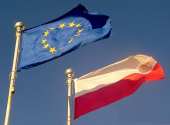
The recent local election in Thuringia, a former East German state, has raised alarm among Jewish leaders as the far-right Alternative for Germany (AfD) party secured its first victory in a top
political post within the district. Robert Sesselmann, an AfD candidate, emerged as the winner in the district council run-off election in Sonneberg, receiving 52.8% of the vote and unseating the incumbent from the center-right Christian Democratic Union (CDU).
This victory grants the AfD administrative control over the area, marking a significant development for the party, which was launched in 2013 with an anti-immigrant, anti-European Union, and ultra-nationalist platform. The AfD gained its first seats in the national parliament in 2017, following Germany's acceptance of over a million refugees, predominantly from Syria, Afghanistan, and Sudan.
Critics view any success for the AfD as a threat to Germany's democratic security. The party currently enjoys the support of 18%-20% of voters across the country, according to polls. Mainstream political parties in Germany have pledged not to form governing coalitions with AfD representatives. The Thuringian branch of the AfD, led by Björn Höcke, is considered by Germany's domestic intelligence agency as far-right extremists.
The election outcome has raised concerns among Jewish leaders, as the AfD has been associated with xenophobic, anti-democratic ideologies, and some of its leaders have trivialized the Holocaust. In response, the Buchenwald memorial in Thuringia banned AfD representatives from attending memorial ceremonies indefinitely in 2019. Josef Schuster, President of the Central Council of Jews in Germany, warned that this election result could pave the way for a party espousing xenophobia and anti-democratic values.
While not all AfD voters hold extreme right-wing views, their support for a party considered extreme right-wing by the State Office for the Protection of the Constitution is troubling, according to Schuster. Charlotte Knobloch, head of the Jewish community of Munich and Upper Bavaria, expressed concern, stating that such voters are undermining the foundations of a stable democracy in Germany. Björn Höcke, known for criticizing Germany's national Holocaust memorial, described Sunday's victory as a positive sign for the upcoming state parliamentary elections in Saxony, Thuringia, and Brandenburg. The outcome of this small district election may serve as a precursor for future political trends in the eastern states of Germany. Photo by PantheraLeo1359531, Wikimedia commons.



































